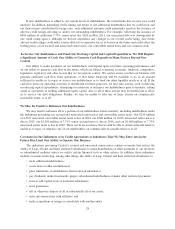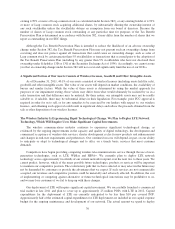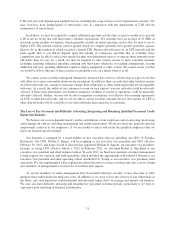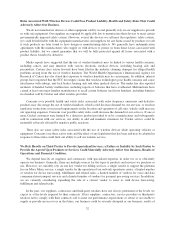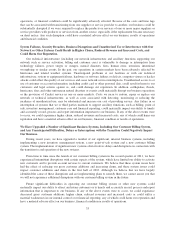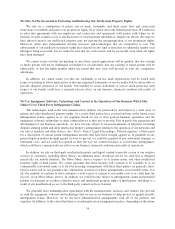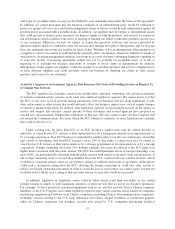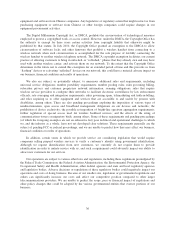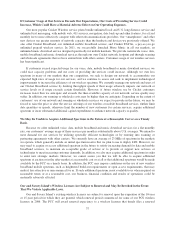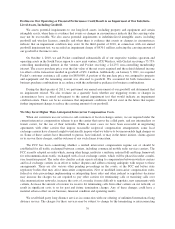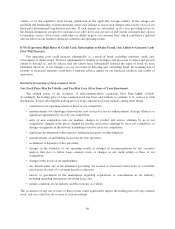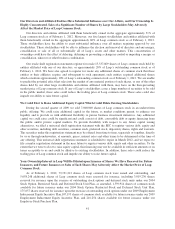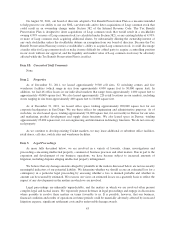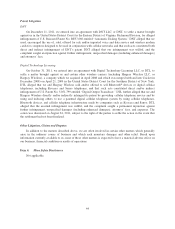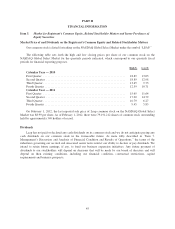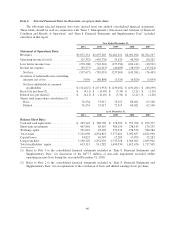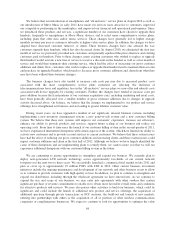Cricket Wireless 2011 Annual Report Download - page 48
Download and view the complete annual report
Please find page 48 of the 2011 Cricket Wireless annual report below. You can navigate through the pages in the report by either clicking on the pages listed below, or by using the keyword search tool below to find specific information within the annual report.application, has provided substantial service during its past license term and has substantially complied with
applicable FCC rules and policies and the Communications Act. Historically, the FCC has approved our license
renewal applications. However, the Communications Act provides that licenses may be revoked for cause and
license renewal applications denied if the FCC determines that a renewal would not serve the public interest. In
addition, if we fail to timely file to renew any wireless license, or fail to meet any regulatory requirements for
renewal, including construction and substantial service requirements, we could be denied a license renewal.
Many of our wireless licenses are subject to interim or final construction requirements and there is no guarantee
that the FCC will find our construction, or the construction of prior licensees, sufficient to meet the build-out or
renewal requirements. FCC rules provide that applications competing with a license renewal application may be
considered in comparative hearings, and establish the qualifications for competing applications and the standards
to be applied in hearings. The FCC recently initiated a rulemaking proceeding to re-evaluate, among other things,
its wireless license renewal showings and standards and may in this or other proceedings promulgate changes or
additional substantial requirements or conditions to its renewal rules, including revising license build-out
requirements. We cannot assure you that the FCC will renew our wireless licenses upon their expiration. If any of
our wireless licenses were to be revoked or not renewed upon expiration, we would not be permitted to provide
services under that license, which could have a material adverse effect on our business, results of operations and
financial condition.
Future Declines in the Fair Value of Our Wireless Licenses Could Result in Future Impairment Charges.
As of December 31, 2011, the carrying value of our and Savary Island’s wireless licenses (excluding assets
held for sale) was approximately $1.8 billion. During the years ended December 31, 2011, 2010 and 2009, we
recorded impairment charges of $0.4 million, $0.8 million and $0.6 million, respectively, with respect to our
wireless licenses.
The market values of wireless licenses have varied over the last several years, and may vary significantly in
the future. Valuation swings could occur for a variety of reasons relating to supply and demand, including:
• consolidation in the wireless industry allows or requires carriers to sell significant portions of their
wireless spectrum holdings;
• a sudden large sale of spectrum by one or more wireless providers occurs; or
• market prices decline as a result of the sale prices in FCC auctions.
In addition, the price of wireless licenses could decline as a result of the FCC’s pursuit of policies designed
to increase the number of wireless licenses available in each of our markets. For example, during recent years,
the FCC auctioned additional spectrum in the 1700 MHz to 2100 MHz band in Auction #66 and the 700 MHz
band in Auction #73, and has announced that it intends to auction additional spectrum in the future for mobile
wireless use. If the market value of wireless licenses were to decline significantly, the value of our wireless
licenses could be subject to non-cash impairment charges.
We assess potential impairments to our indefinite-lived intangible assets, including wireless licenses,
annually and when there is evidence that events or changes in circumstances indicate that an impairment
condition may exist. We conduct our annual tests for impairment of our wireless licenses during the third quarter
of each year. Estimates of the fair value of our wireless licenses are based primarily on available market prices,
including successful bid prices in FCC auctions and selling prices observed in wireless license transactions,
pricing trends among historical wireless license transactions, our spectrum holdings within a given market
relative to other carriers’ holdings and qualitative demographic and economic information concerning the areas
that comprise our markets. A significant impairment loss could have a material adverse effect on our operating
income and on the carrying value of our wireless licenses on our balance sheet.
38


